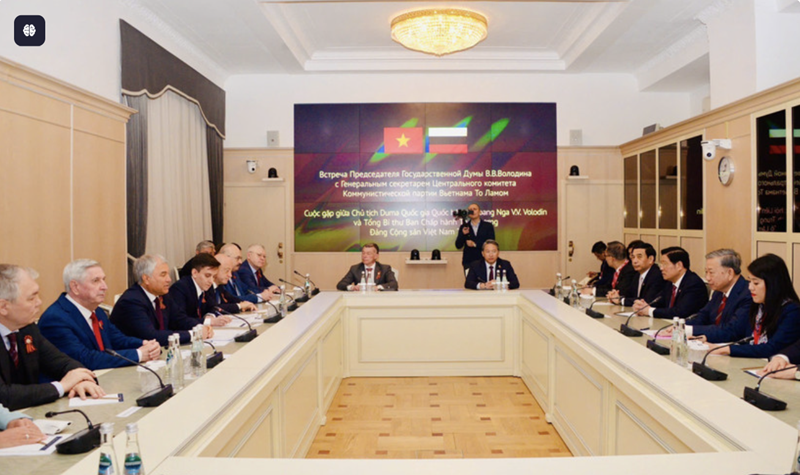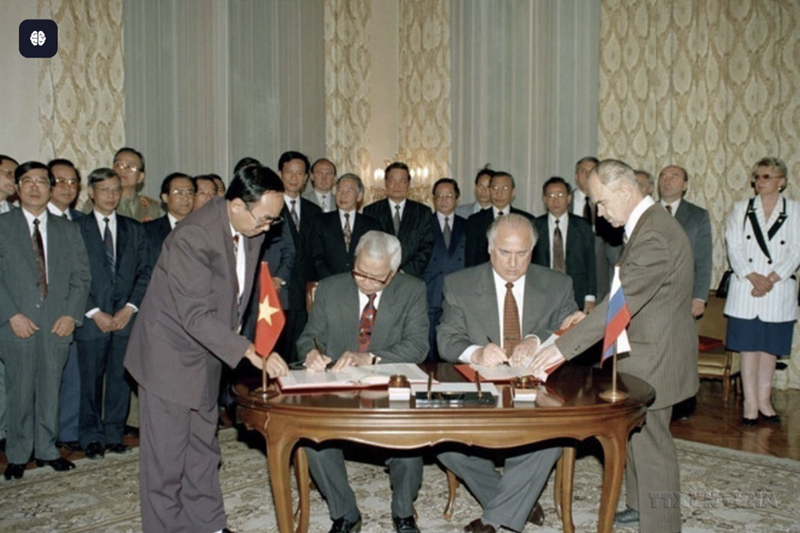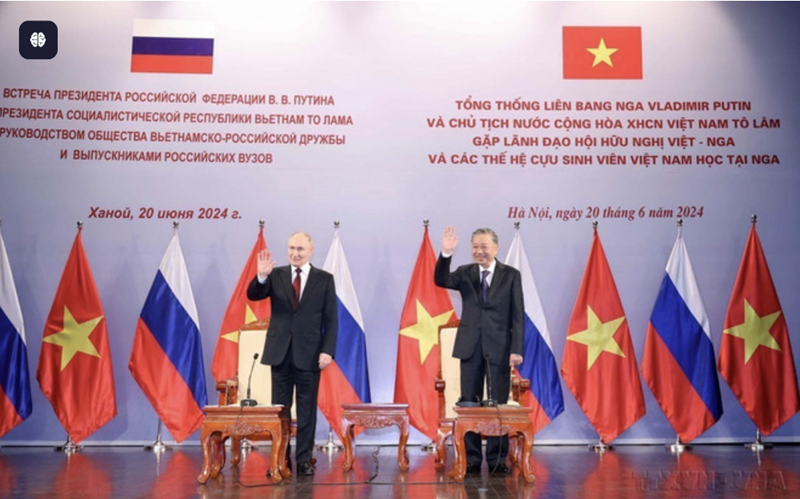This marks his third visit to Vietnam by Volodin as Duma Chairman, during which he will also co-chair the fourth session of the Vietnam – Russia Inter-Parliamentary Cooperation Committee.
Over seven decades of trust-based friendship
The Soviet Union was among the first nations worldwide to recognize and establish diplomatic relations with Vietnam, on January 30, 1950, laying the foundation for enduring friendship and cooperation. Over the past 75 years, both nations have seen their ties developing comprehensively.
    |
 |
|
The meeting between Party General Secretary To Lam and Chairman of the State Duma of the Russian Federal Assembly Vyacheslav Volodin in Moscow on May 10, 2025 |
Vietnam has received sincere and whole-hearted support from the Soviet Union and later the Russian Federation throughout its struggle for national independence and nation-building process.
The Treaty on Fundamental Principles of Friendship between the Socialist Republic of Vietnam and the Russian Federation, signed on June 16, 1994, was a historic document that opened a new chapter of all-round cooperation between the two countries while creating a prerequisite for elevating bilateral relations to a Comprehensive Strategic Partnership in 2012.
    |
 |
|
Vietnamese Prime Minister Vo Van Kiet and his Russian counterpart Viktor Chernomyrdin sign the Treaty on Fundamental Principles of Friendship between the Socialist Republic of Vietnam and the Russian Federation in 1994. |
Four years ago, Vietnam and Russia issued a joint statement on the vision of their Comprehensive Strategic Partnership for 2030. Within this framework, their cooperation has made strong progress across all spheres, with high political trust and regular exchanges of delegations at all levels.
Most recently, during a state visit to Vietnam by Russian President Vladimir Vladimirovich Putin in June 2024, the two sides released a joint statement on further intensifying the Comprehensive Strategic Partnership on the basis of the achievements gained during the 30-year implementation of the Treaty on Fundamental Principles of Friendship. It reflects both sides' resolve to foster increasingly effective and substantive cooperation in all aspects to match the Comprehensive Strategic Partnership and meet the two peoples' demand and interests.
High-level exchanges have been particularly frequent from the outset of this year. Highlights include Russian Prime Minister Mikhail Mishustin’s visit to Vietnam in January, Party General Secretary To Lam’s official trip to Moscow in May for the 80th anniversary of victory in the Great Patriotic War, and multiple meetings between leaders on the sidelines of international forums and events.
Besides, they have maintained various cooperation mechanisms and worked closely with each other at multilateral forums and international organizations like the UN, Asia-Pacific Economic Cooperation Forum (APEC), Asia-Europe Meeting (ASEM), and ASEAN Regional Forum (ARF).
Fruitful cooperation across areas
Economic and trade relations have grown steadily, particularly since the Vietnam – Eurasian Economic Union Free Trade Agreement took effect in October 2016. Bilateral trade reached 4.58 billion USD in 2024, and 2.98 billion USD in the first seven months of this year. Russia is now running 207 active investment projects worth 990 million USD in Vietnam while Vietnamese investors hold 17 projects valued at 1.6 billion USD in Russia.
Energy remains an important pillar of cooperation, with negotiations underway for the signing of protocols and inter-governmental agreements on the areas of geological exploration and oil and gas exploration, and discussions on reviving nuclear energy collaboration. In the meantime, science-technology and education-training partnerships have been accelerated. Russia offers around 1,000 scholarships annually and hosts more than 5,000 Vietnamese students at present.
Cultural cooperation has added vibrancy to the bilateral ties. Vietnam recently held a cultural festival in Moscow’s Red Square, attracting nearly one million visitors, while Vietnamese singer Duc Phuc’s victory at the Intervision international music competition has created fresh momentum for cultural exchange.
Meanwhile, the 70,000-strong Vietnamese community in Russia continues to play a bridging role in promoting friendship and mutual understanding.
Enhanced parliamentary cooperation
Cooperation between the two parliaments have been consolidated unceasingly. Vietnam’s National Assembly signed cooperation agreements with the Russian State Duma in 2009 and 2013, and with the Federation Council in 2012.
The Vietnamese National Assembly and the Russian State Duma established the Inter-Parliamentary Cooperation Committee in 2018, the first of its kind between Vietnam’s legislature and a foreign parliament. Through this mechanism, both sides have supported the countries' Governments and localities in promoting cooperation in areas of priorities.
    |
 |
|
State President To Lam and Russian President Vladimir Putin meet with leaders of the Vietnam - Russia Friendship Association and generations of Vietnamese alumni in Russia on June 20, 2024. |
In addition, the 15th National Assembly of Vietnam set up the Vietnam – Russia Parliamentary Friendship Group while the Federation Council and State Duma of Russia also established similar groups.
Vietnamese Ambassador to Russia Dang Minh Khoi said that Vyacheslav Volodin’s official visit takes place in a year marked by major anniversaries, including the 75th anniversary of Vietnam – Russia diplomatic relations, the 80th anniversary of Vietnam’s National Day, and the 80th anniversary of the Soviet victory in the Great Patriotic War.
Against this backdrop, it reflects the determination of both sides to preserve their traditional friendship while elevating their comprehensive strategic partnership to a new phase of development on the foundation of high political trust.
In addition, the visit will contribute to strengthening the Vietnamese National Assembly's cooperation with the Russian State Duma in particular and the Russian Federal Assembly in general, enhancing exchanges and coordination between the two countries' specialized committees and parliamentary friendship groups, as well as coordinating actions at international and regional inter-parliamentary forums.
The visit is an opportunity for the leaders of the two countries to discuss bilateral cooperation issues, from economy, trade, oil and gas, and science and technology to education, culture, defense, and people-to-people exchanges. It provides a chance to strengthen bonds between the two legislatures, advance important cooperation projects, remove existing obstacles, and define orientations for future collaboration.
Source: VNA